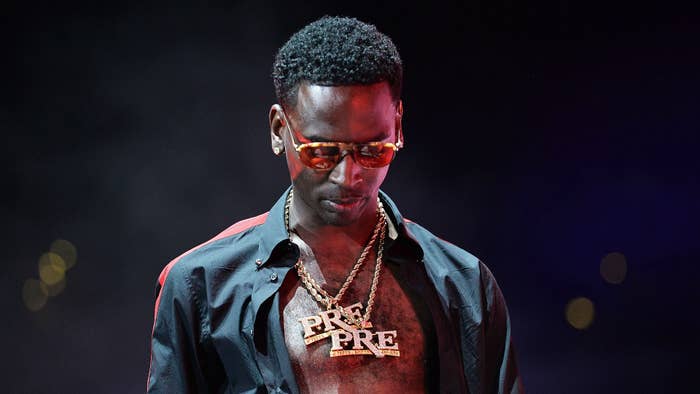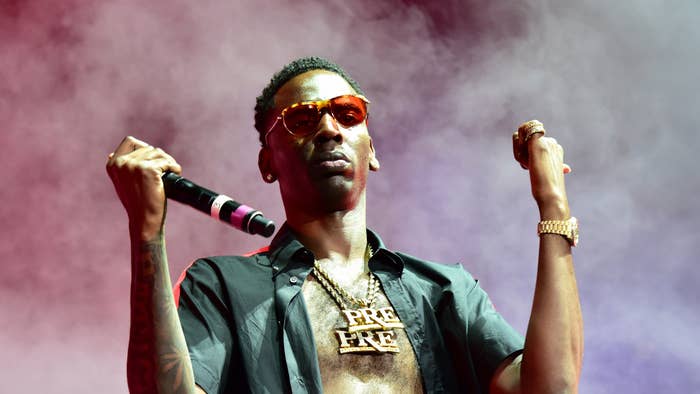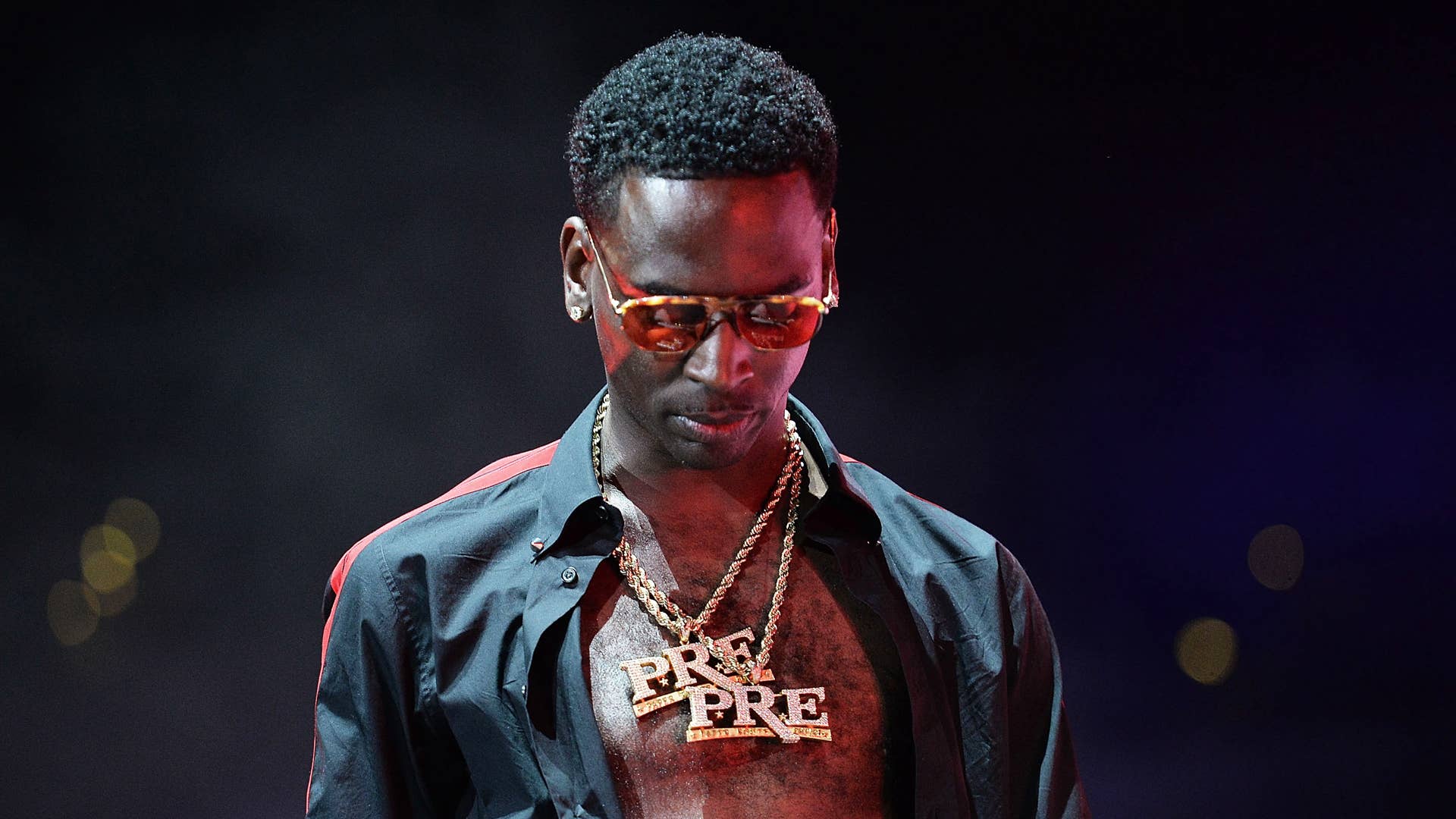
Whether you knew Young Dolph through his music or you had the privilege of spending time with him in person, you always had a story to tell. The Memphis rapper’s braggadocio was underscored by a gift for introspection and a willingness to make sure that everyone went along for the ride with him. Fans who heard his booming bravado and hilarious deadpan punchlines got to feel like they were riding shotgun through South Memphis in his fleet of luxury cars, and local residents who had the chance to rub elbows with him were treated like royalty.
Young Dolph, born Adolph Robert Thornton Jr., began his rap career in 2008, with the release of his first mixtape, Paper Route Campaign. After a two-year break between his initial project and 2010’s Welcome 2 Dolph World, he soon became one of the more prolific artists in Memphis, releasing no less than two projects per year from 2011 to 2019, and it wasn’t long before bigger acts took notice of the following that Dolph was building. In 2013, he dropped East Atlanta Memphis, a collaborative mixtape recorded alongside Gucci Mane, helping to expand his audience even further outside of city limits.
That’s not to say that he ever forgot where he came from, though. Dolph displayed a level of generosity that made him one of the most beloved public figures in his city. The love that he received was always returned in kind. In 2020, he donated $25,000 to his old high school and explained, “That’s why I do it for the kids and youth. They look up to me. It would be a different thing if I didn’t know it or didn’t think it or if I was just so into myself that I’m focusing on me or what I got going on. It’s like, no, they literally look up to us.”
He was well-known locally for his regular turkey giveaways, where he would hand out the birds by the hundreds, even running back to the store in 2015 when the supply ran low. For these reasons, among many others, he’s one of the biggest rap legends that his hometown has ever seen. There’s no understating what he meant to Memphis, as a local star who made good and never turned his back on his people. He’s spoken extensively about having a longtime connection to the city, explaining how badly everyone wanted to see him win. When he finally got his first show in the city, he was paid $5,000. What did he do? Threw all of the money right back to the fans who made him. Those are the things that won’t ever be forgotten.

As a young man growing up in poverty-stricken South Memphis, he made a name for himself as a local street entrepreneur, having moved to the city from Chicago at the age of 2 with his family, alongside two brothers and two sisters. His grandmother may have raised him, but he’s never spoken ill of his parents. He shares these stories in his music, as his thick Memphis drawl allows him to embody the city as few others can. It gives his music more of a cozy feel, making it feel like you’re receiving advice from a streetwise uncle who’s been through it all and seen even more.
The city embraced him because he was one of them. Sure, he might have a $30,000 watch on, but he’s never too good for Ramen noodles. He may have drawn from a unique well of influences (he credits Jay-Z and C-Murder for being the primary components of his sound), but when you heard that bass-heavy baritone, you heard South Memphis. In fact, this year’s turkey giveaway was actually scheduled the same day that he was slain. For his part, he credited all of the success that he had to the family atmosphere that Memphis provided him.
There’s no understating what Young Dolph meant to Memphis, as a local star who made good and never turned his back on his people.
“Ain’t nothing like family,” Dolph said in an interview in 2018. “When you come to Memphis you get the family vibe. All of my partners, friends, they’re from my neighborhood. Everyone here is for the support, and it’s really just about capturing the positive vibe around the holidays.” He took a great deal of pride in mentoring local children and giving them tips and pointers, so that they could avoid the same pitfalls he experienced.
Dolph’s generosity was never constrained to Memphis city limits, however. When two Duke University baristas were fired from their coffee shop for playing his music on the clock, he flew them to Rolling Loud and gifted them $20,000 a piece. When skeptics claimed that he was faking a Lamborghini giveaway to pump up pre-orders for his 2018 album, Rich Slave, he proved them wrong by showing up at a fan’s Dallas home to personally gift them an Aventador S Roadster worth $412,000.
The fan eventually decided to sell the car once it had appreciated in value. Dolph’s response was true to form: “Get paid, young woman, get paid.” Another lucky fan won a Dolph giveaway for a Dodge Challenger SRT Hellcat before graciously accepting his alternative offer of $30,000. Before being tragically killed by unknown gunmen at a local cookie shop at 36 years old on Nov. 17, 2021, Dolph had already accomplished everything that he had set out to do in the music industry. In the final years of his life, he had even been playing up the idea of retiring for good, although he could never quite bring himself to walk away.
“I can’t do it, real talk. I can’t do it,” he said during a recent interview on Big Bank and DJ Scream’s Big Facts podcast, going on to call himself the spokesperson for those who are in the streets and those who are trying to establish themselves as viable independent artists. Dolph explained his independent grind thusly: “In the game, you’ve got some people who’ve got money, but their music is kind of off, their music is garbage. Then, you have people with good music, but they ain’t got the biggest part: They ain’t got the funds. But me, I’m just all the way around the board. It’s nothing. I ain’t did nothing to get in but work my ass off.”
As the reigning patriarch of Paper Route Empire, Young Dolph knew how to market himself like few others. As an independent artist, he did the groundwork himself, taking his music to local clubs, breaking it with local DJs, paying name DJs for hosting duties, and buying his own features. How could a record label tell him how to speak to the streets that he came from better than he could? Dolph continued to prove this point over the course of seven albums (including two collaborations with his artist Key Glock), 19 mixtapes, and a Paper Route Empire compilation album.
Dolph’s braggadocio was a central element of his music, but it wasn’t the defining aspect. Conversations with his parents litter his lyrics (“My mama just called me tipsy, said she brought me in and she’ll take me out” on “At The House” is one of the most hilarious asides), giving his boasts a lived-in sense of warmth. It’s commonplace for artists in Dolph’s orbit to lapse into boilerplate, but his sense of humor consistently set him apart.
He was far from just a class clown, though, and his lyrics are peppered with the type of introspection that comes naturally to someone who enjoys their own company. “I’ma keep it one hundred. A n***a an entertainer, but I like being by myself,” he elaborated to Scream and Big Bank. “I like peace and quiet. It’s like I’m a loner. I do better and come up with shit better. I make money and do a lot of shit better just being by myself.”
“While U Here” serves as a prime example of this thoughtful side, a heart-wrenching song about the fragility of life and the importance of telling the people you love just how much they mean to you while you still have the chance. He was hyper aware of the influence he had on his own children and nephews, as lyrics like, “Everything that I do, I got a son watching now/I got nephews and lil cousins that look up to me,” hit like a punch to the gut in the midst of his fun-loving street anthems.
Through his career, Dolph acquired a sizable rolodex of collaborators, working with a who’s who of mainstream (and underground) Southern rap royalty: Gucci Mane, Future, Migos, Young Thug, Jeezy, 2 Chainz (they went back to the Tity Boi days), T.I., Rick Ross, Megan Thee Stallion, Bun B, 8Ball + MJG, Slim Thug, Paul Wall, Juicy J, Project Pat, 21 Savage, Lil Yachty, Plies, Curren$y, Starlito, Don Trip, Fiend, Trae the Truth, Waka Flocka, Peewee Longway, Young Scooter, the late Doe B. That’s not to say that his appeal was strictly regional, though. Dolph’s music earned him fans and collaborators all over the country, including Snoop Dogg, Wiz Khalifa, Lil Durk and Jadakiss.
His relationship to the mainstream existed on his own terms, as he helped propel OT Genasis’ “Cut It” into a double platinum top 40 hit, showcasing his propensity for show-stealing verses in the process. When he found his way to A-list producers like Mike Will and Metro Boomin, their production bent to his whims, not vice versa. Chasing trends was never on Dolph’s agenda.
He may have made it to the top on his own, but he was more than willing to throw a ladder down for everyone.
For someone who served as a larger-than-life figure to most, he had a way of writing that made him very easy to relate to. When the pandemic first arrived and we were wiping down our groceries and doorknobs, it was Dolph who provided us with a much-needed moment of levity by going back and Photoshopping masks on all of his album covers on streaming services.
From there, he proceeded to drop “Sunshine,” one of his most incisive commentaries. Like many of us, Dolph needed the time off and wasn’t too bummed about the concept of taking a break in the midst of the pandemic, and he poured that feeling into the song. He raps about how his daughter was much happier because he was around more by virtue of everything being shut down, and he prays for the nurses and doctors who were on the frontlines, dealing with the most tragic effects of the pandemic firsthand. This is all before the second verse, where he issues a gut-wrenching apology to his family, admitting that his relentless pursuit of wealth was selfish. Lots of rappers have made these types of songs in the past but Dolph’s willingness to open up and be truly vulnerable is what makes his lyrics stick to the ribs.
Dolph may have been a trap artist by trade, but the spirit of the blues runs deep in his catalog, and there’s a powerful sense of empathy that permeates his lyrics. He’s been frank about his parents’ struggles with addiction, but similarly vocal about not holding any grudges. He notices that the neighbors are stealing lights and cable, but there’s no sense of judgement. As his writing evolved, he became the rarest of rarities: a street rapper in his mid-30s with a steadily growing audience and more to say than ever.
It’s easy, however, to envision a universe where he took a step back from recording solo projects to work on building a Paper Route Empire infrastructure that could serve as a long-term pipeline for local talent. He had already helped to elevate Key Glock (his cousin through marriage) into a local superstar himself. The two have released two beloved collaboration albums, birthing one of Dolph’s biggest hits (the RIAA gold certified “Major”). His eye for local talent didn’t stop there, as he also played an instrumental role in helping PRE signees like Jay Fizzle and Big Moochie Grape build a more notable profile.
This is all by design, of course. Dolph never portrayed himself as someone who was a particularly tough act to follow. He was providing the blueprint to anyone who wanted to listen. He may have made it to the top on his own, but he was more than willing to throw a ladder down for everyone. This is one of the many reasons why the reverberations of his passing will continue to resonate in Memphis for years to come.
Most importantly, he leaves behind two children, Tre and Ari (ages 7 and 4) and his longtime partner Mia Jaye. His music was peppered with references to their inheritances (“told my son when I’m gone, you gon’ be a rich lil’ bastard”) but Dolph was more than just a provider for himself and others. He was the millionaire rapper next door, the type who would enthusiastically support the local cookie store when most artists of his stature would be securely tucked in a suburban enclave hours from the city.
Now, Memphis and the greater rap world at large are left with one unanswerable question: Why? There are no easy answers today, and they may never come. There is no way to replace an artist and a man who personified the city of Memphis to this extent. If a person is measured by the way they treat those that can do nothing for them, Dolph is someone whose example will live on for generations to come.




